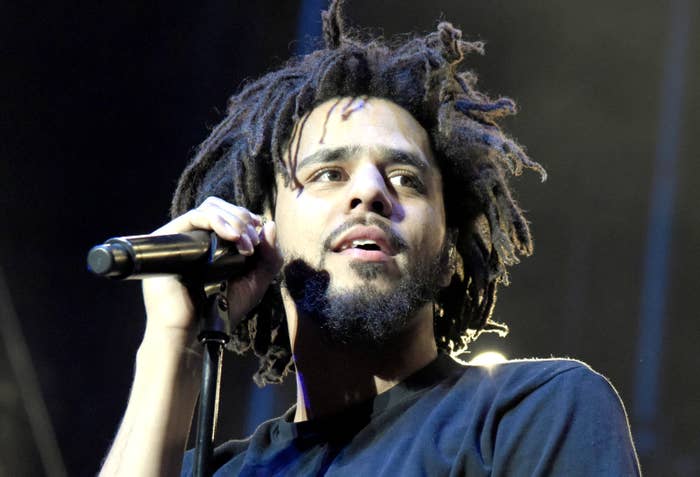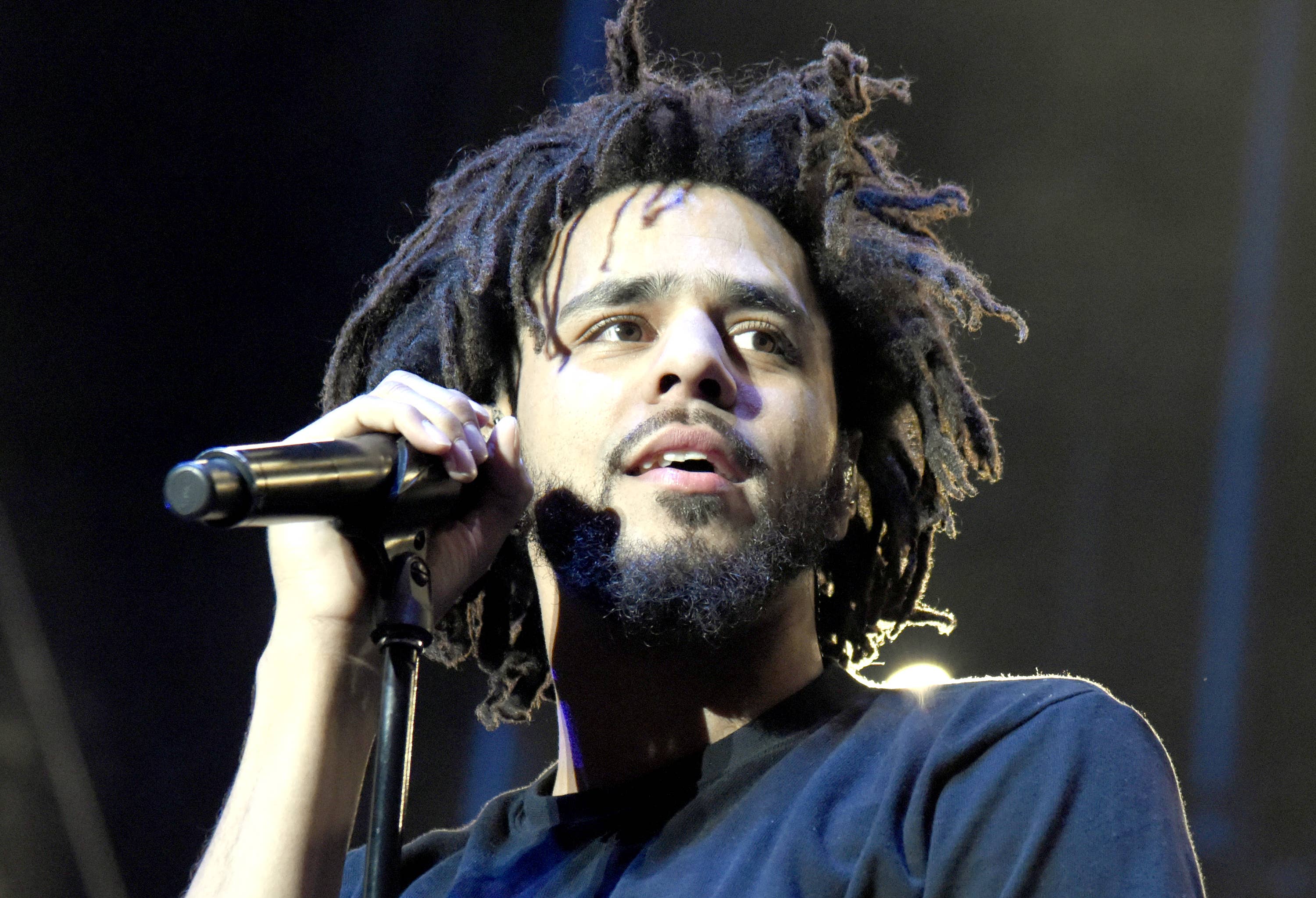
The characters in J. Cole’s stories tend to be under immense pressure. From the hormonal deluges of songs like “Wet Dreamz” and “Lights Please” to the crippling grief of “Be Free” and “4 Your Eyez Only,” his subjects move under intense strain. For dramatic impact, J. Cole often pauses his narratives right as characters make critical decisions. On “Once an Addict,” the story of Cole witnessing his mother’s grief become addiction, time stops during a phone call as he considers if and how he can save her. Rhetorical questions come and go, and then the moment does too, and suddenly his mom is a full-blown addict. KOD, J. Cole’s fifth album, fixates on moments like this in service of saving other addicts from a similar fate. The project is a sort of pan-intervention, a PSA addressed to and intended for a generation.
The album’s cover art depicts J. Cole as a dazed monarch shrouding narcotized children and skeletons in a flowing robe. Part Bebe’s Kids, part SpongeBobclose-up, the image is provocative and disorienting. Is Cole killing the kids or protecting them? Did he provide the drugs they’re using or are they all victims, him included? There are no clear answers. Even the album’s title is open-ended. Cole has provided three variant breakdowns of the acronym: Kids on Drugs, King OverDosed, Kill Our Demons. The titles are more useful as a whole than separate; they signal the rapper’s expansive idea of addiction. Tackling subjects as minor as digital romance and as large as the tax system, he presents addiction as any abusive relationship, treating them not just as vices or bad habits, but as markers of trauma and pain.
J. Cole’s insistence that rappers are a particularly vulnerable population feels strange. He’s either entirely oblivious to a large swath of the rap community, or arrogantly talking over it.
The magnitude of this mission necessitates an array of relationships and thus characters. J. Cole enlists his mom, a fleet of drug-addled rappers, a cheating partner, a social media user, freeloading friends, and even himself to explore addiction. Unlike 2016’s 4 Your Eyez Only, where Cole often melded his perspective with those of others, on KOD the points of view are discrete and distinct. This has advantages and drawbacks. The benefits are seen on “Once an Addict,” where he slowly pushes his mother away as her alcoholism and depression lead her to harder substances. By narrating as himself, J. Cole is able to dwell on the pain of witnessing addiction while also hinting that seeing pain is not the same as experiencing it. This account of his mom’s descent is full of gaps and omissions and confusion at what he sees. As the story unwinds, you can feel him sense he is just an observer, that his empathy has limits.
Likewise, on “Brackets” Cole’s banter with a demanding Uncle Sam draws attention to how little even the richest taxpayers know about where tax money goes. Cole’s affected disbelief sets the stage for the second half of the song, where the tax money creates the conditions for a mother’s son to be murdered. By the story’s end Cole is again forced to reckon with the limits of his means, emotionally and fiscally.
The downside to these more discrete personas is that J. Cole isn’t much of a character actor. The further he gets from his own experiences, the more he traffics in vague characterizations. “Motiv8” and “ATM,” for example, feature Cole’s impressions of contemporary rap. His brusque triplets and catchy, repetitive choruses give his performances a somewhat mocking quality. On the other hand, lines like, “spill promethazine inside a double cup” and “money it give me a hard-on” seem to be attempting some sort of critical mimicry. On “Motiv8” Cole’s voice shrinks to a chilling murmur as he chants, “I’m feeling alive;” it sounds like he’s dying. Elsewhere, relationship parable “Kevin’s Heart,” features Cole whining out a tepid “skrt” as an ad-lib in the chorus, and “KOD” includes a dark humblebrag about drinking so much Actavis that he acquires an Actavis endorsement. It makes sense for tone to vary across an album and across characters, but J. Cole’s impersonations are so scattered that they obscure any clear purpose. It’s hard to tell whether he’s mocking rap or mourning rappers.
Neither goal even makes particular sense in the context of the album or in rap at large. From album-length works like Future’s DS2, Danny Brown’s Atrocity Exhibition, Father’s I’m a Piece of Shit, and Isaiah Rashad’s The Sun’s Tirade; to individual songs like Nicki Minaj’s “Pills N’ Potions,” Kendrick Lamar’s “Swimming Pools,” Future’s “Perkys Calling,” and Chance the Rapper’s “Finish Line,” the danger of hard drugs has been focal a topic in rap for nearly a decade. Gucci Mane 2.0 is a walking ambassador to sober living; Pimp C and A$AP Yams are martyrs. In this climate, J. Cole’s insistence that rappers are a particularly vulnerable population feels strange. He’s either entirely oblivious to a large swath of the rap community, or arrogantly talking over it.
This focus on rappers ultimately reveals the dead air at the center of the album. For all his concerns about addiction across society, Cole fails to meaningfully connect that crooked crown on the cover to Uncle Sam to his mother to whatever SoundCloud rappers he’s dissing on “1985.” Beyond himself and his mother, his addicts lack character, specificity, pathology. “Photograph” could describe any social media network: “Friends” dances around the drugs haunting his homies. J. Cole’s addicted society is an anonymous horde, never quite gelling into the omni-issue he wills it to be. Even if the kids on the cover are caricatures of the young rappers he’s dueling with, does Cole really think his heartbroken single mom and a nouveau riche rapper are battling the same demons? Does he really believe some guy’s Instagram obsession is as destructive as a percocet habit? In his rush to link all pain, to confront all addiction, J. Cole flattens the differences between drugs, between coping mechanisms and crutches. J. Cole wants KOD to be bigger than rap, but instead it’s bloated, another oversized loudspeaker wailing into the void.

